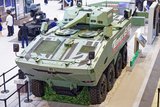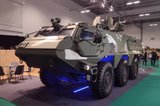USMC tests M320 grenade launcher
The US Marine Corps is testing the M320 grenade launcher module at Camp Lejeune, North Carolina, the corps announced on 9 June.
One of the first USMC unit to be issued with the M320 - Bravo Company, 2nd Combat Engineer Battalion - is carrying out the firing and handling testing. The M320 has already been in use with the US Army.
The M320 offers a number of capabilities superior to that of its predecessor, the M203. The M320 can be fired as a separate weapon system without being attached to a host weapon, and the sights on the M320 are more user friendly and flexible, increasing the chances of the projectile landing on target with the first shot.
Loading of the M320 barrel from the side allows for longer projectiles with increased velocity. This is different from the M203, which limits the size of projectiles the operator can use, due to the placement of the barrel on the bottom of the weapon system.
The M320 is designed to engage groups of enemy personnel, vehicles, bunkers, provide suppression and obscuration on objectives and mark targets to aid in direct fire. The weapon allows maximum coverage in sectors of fire that direct-fire weapons cannot engage.
Related Equipment in Defence Insight
More from Land Warfare
-
![World Defense Show 2026: Saudi Arabia’s record defence spend highlights uncertain times]()
World Defense Show 2026: Saudi Arabia’s record defence spend highlights uncertain times
Saudi Arabia’s investment in its land forces, notably in the area of air defence as recently as 30 January, is a sign of the challenges the Gulf State faces, particularly the threat from Houthi rebels in Yemen.
-
![Singapore Airshow 2026: ST Engineering’s Terrex s5 highlights hybrid power’s role in future warfare]()
Singapore Airshow 2026: ST Engineering’s Terrex s5 highlights hybrid power’s role in future warfare
Hybrid-electric drive technology may address the growing energy demands of land warfare in future.
-
![CAVS rides a wave and prepares for surge requirements as orders roll in]()
CAVS rides a wave and prepares for surge requirements as orders roll in
The Common Armoured Vehicle System is continuing to rack up orders as the British Army looks likely to become an operator of the vehicle, while Italy and Ireland are also contenders.
-
![US DoD task force’s DroneHunter acquisition lays groundwork for Replicator 2 CUAS strategy]()
US DoD task force’s DroneHunter acquisition lays groundwork for Replicator 2 CUAS strategy
As the US Department of Defense looks to counter the growing threat of uncrewed aerial systems to improve homeland security, the DroneHunter acquisition could point to future commercial innovation.
-
![Land forces review: Tanks, trucks and IFVs dominate but woes remain for Ajax]()
Land forces review: Tanks, trucks and IFVs dominate but woes remain for Ajax
This year has begun with main battle tanks taking the lead while orders for large logistics and support vehicles continued from last year. Additionally, two of the British Army’s most significant contracted vehicle programmes, Ajax reconnaissance vehicle and Challenger 3 tank, continued to make news in January.























